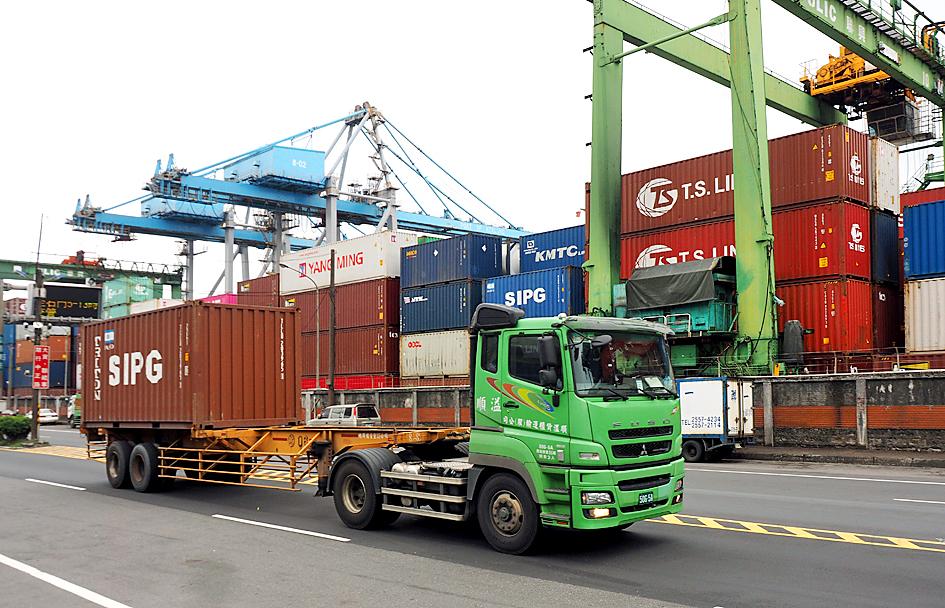The nation’s exports last month declined 2 percent year-on-year to US$27 billion, as cheaper crude oil prices dampened sales of products heavily reliant on raw materials, overshadowing shipments of electronic components, the Ministry of Finance said yesterday.
It was the third straight month the critical economic gauge remained negative and exports might not improve this month or even for the rest of this year, Department of Statistics Director-General Beatrice Tsai (蔡美娜) told a news conference in Taipei.
“The COVID-19 pandemic continued to weigh on sales of products using raw materials, as seen in a 57.3 percent plunge in exports of mineral products,” Tsai said.

Photo: David Chang, EPA-EFE
Likewise, shipments of base metals, plastic and chemical products dropped 15.2 percent, 19.9 percent and 15.6 percent year-on-year respectively, the ministry said in a report.
Exports of textile products slumped 35.1 percent, the second-worst fall since records began, as inventory remained high amid lockdowns in ASEAN and other markets, Tsai said.
However, shipments of electronic components continued to gain traction, logging a 13.2 percent increase to a record high of US$10.24 billion on fast-growing 5G deployment, as well as remote working and learning, she said.
Exports of semiconductors increased 14.2 percent to US$9.2 billion, while those of information and communications products rose 10.9 percent to US$3.95 billion, she said.
Remote learning and working from home might continue at many organizations and companies, boosting demand for data centers, servers and laptops, Tsai said.
Meanwhile, international technology giants pressed ahead with the launch of 5G wireless gadgets, despite the COVID-19 pandemic, providing business opportunities for local companies in their supply chains, she said.
“If the reopening of the economies in Europe and the US goes well, the electronics industry could perform better than expected in the second half of the year,” Singapore-based Barclays Bank PLC economist Angela Hsieh (謝涵涵) said.
“The biggest uncertainty comes from US-China relations, but the impact of that seems limited so far,” Hsieh added.
Exports to China and the US rose the most, gaining 10.6 percent and 9.3 percent respectively, while China accounted for 44.9 percent of overall exports, the ministry said.
Imports fell 3.5 percent to US$22.28 billion, mainly dragged down by cheaper crude oil prices that plummeted 63 percent year-on-year, Tsai said.
However, imports of capital equipment rose 14.2 percent to US$3.7 billion, as local firms, especially semiconductor makers, stood by their plans to upgrade and expand, she said.
The nation posted a trade surplus of US$4.72 billion for last month, a 5.6 percent increase from a year earlier.
The outlook is unlikely to become clear until global economies emerge from the pandemic, Tsai said, adding that exports would decline 2 to 5 percent this month.
That would suggest a decline in second-quarter exports from a year earlier.
In the first five months of this year, cumulative exports rose 1.5 percent to US$130.91 billion, while cumulative imports increased 1.4 percent to US$114.4 billion, creating a trade surplus of US$16.51 billion, the report showed.
Additional reporting by Bloomberg

NEW IDENTITY: Known for its software, India has expanded into hardware, with its semiconductor industry growing from US$38bn in 2023 to US$45bn to US$50bn India on Saturday inaugurated its first semiconductor assembly and test facility, a milestone in the government’s push to reduce dependence on foreign chipmakers and stake a claim in a sector dominated by China. Indian Prime Minister Narendra Modi opened US firm Micron Technology Inc’s semiconductor assembly, test and packaging unit in his home state of Gujarat, hailing the “dawn of a new era” for India’s technology ambitions. “When young Indians look back in the future, they will see this decade as the turning point in our tech future,” Modi told the event, which was broadcast on his YouTube channel. The plant would convert

‘SEISMIC SHIFT’: The researcher forecast there would be about 1.1 billion mobile shipments this year, down from 1.26 billion the prior year and erasing years of gains The global smartphone market is expected to contract 12.9 percent this year due to the unprecedented memorychip shortage, marking “a crisis like no other,” researcher International Data Corp (IDC) said. The new forecast, a dramatic revision down from earlier estimates, gives the latest accounting of the ongoing memory crunch that is affecting every corner of the electronics industry. The demand for advanced memory to power artificial intelligence (AI) tasks has drained global supply until well into next year and jeopardizes the business model of many smartphone makers. IDC forecast about 1.1 billion mobile shipments this year, down from 1.26 billion the prior

People stand in a Pokemon store in Tokyo on Thursday. One of the world highest-grossing franchises is celebrated its 30th anniversary yesterday.

Zimbabwe’s ban on raw lithium exports is forcing Chinese miners to rethink their strategy, speeding up plans to process the metal locally instead of shipping it to China’s vast rechargeable battery industry. The country is Africa’s largest lithium producer and has one of the world’s largest reserves, according to the US Geological Survey (USGS). Zimbabwe already banned the export of lithium ore in 2022 and last year announced it would halt exports of lithium concentrates from January next year. However, on Wednesday it imposed the ban with immediate effect, leaving unclear what the lithium mining sector would do in the